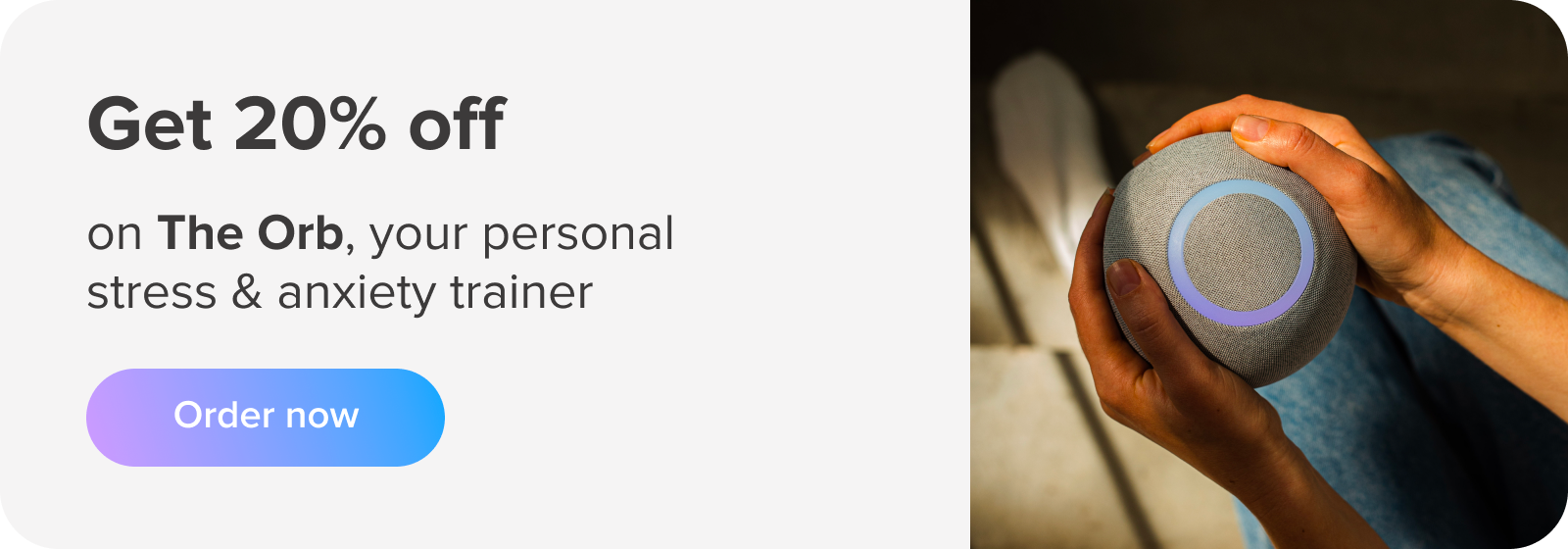A peaceful mind is that elusive state that we’re all chasing after, in one way or another. Because who doesn’t want to feel completely at ease, inside out. But how do you become more peaceful? And does measuring inner peace help or hinder your progress? Let’s find out.
Peace of mind is a way of being that goes beyond thoughts and emotions. It’s when you are – to your core – totally calm and tranquil. Now, with the introduction of home-based biofeedback devices, measuring your own peace of mind is completely within reach. (Which is pretty amazing considering that not so long ago, you needed a licensed therapist to access this info!)
Keep reading as we dig into the best tools, practices, and methods to cultivate and measure your inner peace. And exactly how they can help – or harm – your progress towards peaceful living.

First thing’s first: What is peace of mind exactly?
Imagine that you magically removed from your mind: The ‘what ifs’ about the future.Dwelling on the past.All thoughts including happy, sad, and confusing ones. What would be left? Peace of mind. Or, as the dictionary defines it: A mental state of calmness or tranquility, and a freedom from worry and anxiety.
Peace of mind is when your buzzing brain comes to a standstill, and your mind and emotions become cool and steady. Ultimately, you remain unperturbed by life’s happenings. We don’t know about you, but we want in!
But why does peace of mind matter?
Peace of mind and success is perhaps the most valuable thing we can have. Especially because when we’re without it, we spend a lot of our resources trying to get it back.
Here are a few ways that peace of mind can help you in your life:
- Better concentration and focus. Which also means better productivity, and a to-do list wiped clean!
- A sound, deep sleep. One that leaves you feeling fully rested when you wake up.
- A general feeling of confidence, inner strength, and readiness for any challenge.
- Less stress, including anxious and worried thoughts.
- Pacifying that overactive mind that’s always thinking too much.
- A sense of clarity in all situations. And way less confusion!
Ready to hear more about ‘the how’ behind peaceful living?
Here are 5 ways to invite more inner peace into your life.
Paring back, relaxing, and letting go allows peace to resurface. Here’s how you can do exactly that on a daily basis:
Mindfulness Meditation
Mindfulness meditation is any practice that helps you slip into a state of present moment awareness, without judgment. Studies have shown that it decreases rumination or overthinking, stress, and anxiety.
If you want to give it a try, traditional eastern practices – like yoga, breathwork, mantra meditation, tai chi, and qigong – promote a mindfulness state when practiced daily.
Mini Digital Detox
As our lives have become more virtual in the last couple of years, the screen-free time has become all the more essential. One study shows that higher spirits, reduced anxiety, and improved sleep can result from a social media detox.
So take some time to unplug and get away from your phone and computer…even if it’s just for a couple of hours.
Nature as a Brain Balm
Spending time in nature is like hitting ‘refresh’ on your brain. It’s been shown that immersing yourself in beautiful greenery and fresh air actually triggers a response in your body to lower stress levels.
Just a few minutes in greenery can go a long way, so get out into the outdoors at least once a day if you can.
Alone Time
All too often, solitude is treated the same as loneliness and therefore avoided. But the science shows that striking the right balance between alone time and socializing is key for your mental wellbeing. It can lead to positive states like freedom, creativity, intimacy, and spirituality.
Forgiveness
A grudge or feeling of resentment can affect your physical and mental health, without you even knowing it. Chronic anger (even if it’s subtle) can eat you up inside and result in depression, PTSD, and other negative health inflictions.
The good news? Cultivating the skill of forgiveness is the antidote, resulting in better sleep, less pain, and lower levels of stress and anxiety. All in all, doing less is more when it comes to inner peace. But how can you tell if these practices are actually working? Science has the answers.
Measuring inner peace: science says it’s possible.
Science has made some incredible progress when it comes to quantifying inner peace. Scientists have even successfully developed a PEACE scale to measure an individual’s level of peace.
Out in the world, this scale can be used to evaluate peace-building efforts in conflict-affected regions, the effectiveness of health initiatives, and so much more. But if you’re looking for something you can easily use at home, home-based biofeedback devices are the answer.
These devices monitor your physiological levels to detect your levels of stress and anxiety. With the help of this tech, you’ll get the most accurate snapshot of how much peace you’re experiencing (or not experiencing!). But is quantifying your inner peace helpful?
The answer: It depends on how you use it.
As user-friendly biofeedback devices are growing in popularity, some argue that quantifying peace is somewhat of an oxymoron, while others argue that they're a necessary tool for creating a relaxation routine that works.
Here’s our take on it: If you focus too much on the numbers, measuring your inner peace can absolutely hinder your efforts to relax. At the same time, if you use the devices how they were meant to be used – as a middle path between obsessing over numbers and relying completely on feelings – they can amplify the power of your relaxation practice.
Quantifying your peace can give you invaluable insights into whether your practice is actually working on a physiological level. And if it’s not? You can switch it up until you find something that does work.
How can measuring your peace of mind benefit you?
Our biofeedback device, Reflect, shows you how. The Reflect Orb is a relaxation tool that helps you become aware of and accept your own stress patterns – the first steps towards control. Although you can look at the stats and graphs, this tool isn’t designed for you to analyze numbers and data. Instead, it offers an objective way to monitor your stress levels and find ways to reduce them.
Once you know what works for you, the Orb helps you develop a daily practice that encourages peace of mind success in the long-term. Get to know your own body and invite calm into your life with the help of the Reflect Orb.







